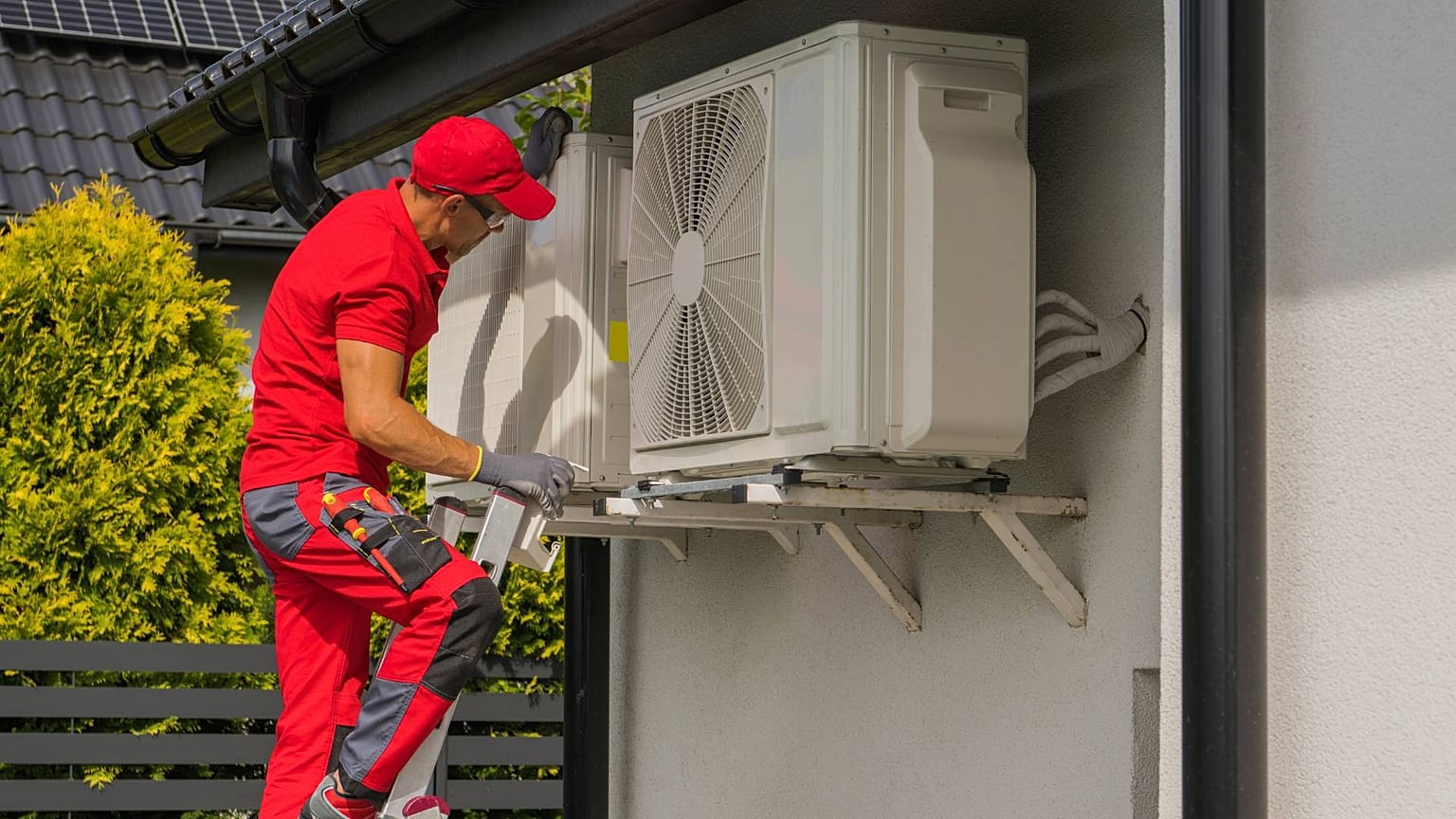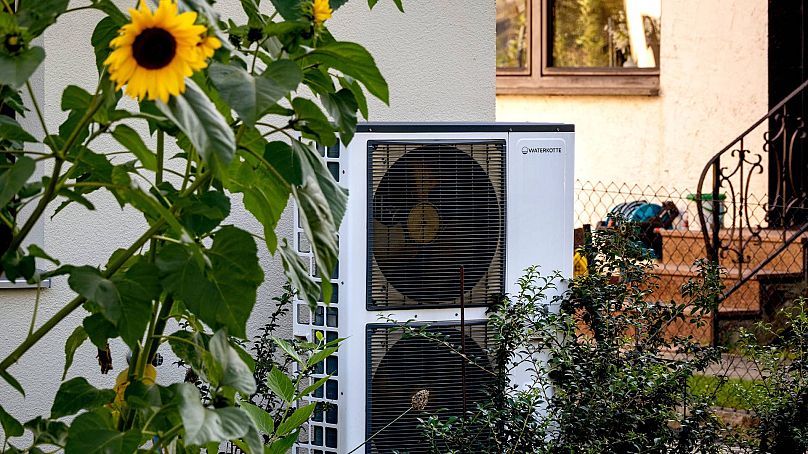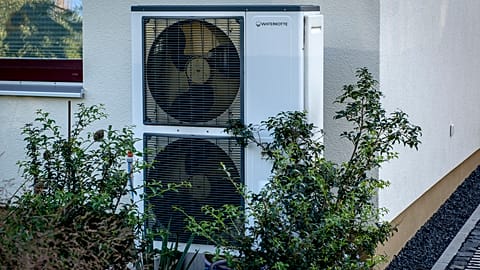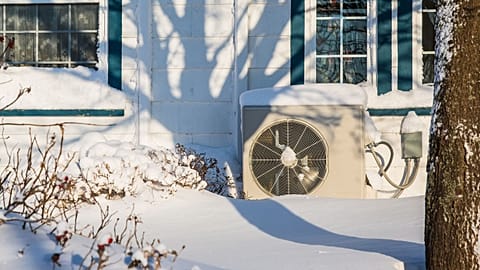Heat pumps are expensive - but these government subsidies are making them affordable for homeowners.
Heat pumps have increasingly emerged as a strategic technology in the transition to green energy, but they are prohibitively expensive for most people.
 ADVERTISEMENT
ADVERTISEMENT
 ADVERTISEMENT
ADVERTISEMENT
“Clean heating must be the financially most attractive choice overall,” says Jozefien Vanbecelaere, Head of EU Affairs of the European Heat Pump Association (EHPA). She calls on governments to offer heat pump subsidies with a long-term vision.
In the UK, the purchase and installation of an air source heat pump amounts to approximately £10,000 (€11,500), whereas it costs between £2,500 (€2,897) and £3,000 (€3,477) for a typical gas boiler. So the upfront expense is, on average, two to four times higher than a gas boiler.
Various EU legislative initiatives including REPowerEU, which promotes the transition to clean energy and decarbonisation policies, have called on Member States to establish subsidy programs for heat pumps. The EU aims to reduce its dependence on gas - in particular that supplied by Russia. Several countries have already launched grant schemes.
So, what kind of heat pump grants are available in European countries? And are they attractive enough to encourage people to take action?
The UK has increased its heat pump grants by 50 per cent
The British government has made moves to accelerate the growth of heat pump deployment. In October 2023, the government increased heat pump grants by 50 per cent, from £5,000 (€5,795) to £7,500 (€8,692).
The Boiler Upgrade Scheme provides grants to encourage people to replace existing fossil fuel heating with more efficient, low carbon heating systems. These include air source heat pumps, ground source heat pumps and, in limited circumstances, biomass boilers.
There are three main requirements to apply. You must own the property, have installed (or plan to install) your new heating system on or after 1 April 2022, and be replacing fossil fuel heating systems (such as oil, gas or electric).
You can get £7,500 off the cost and installation of an air source heat pump (ASHP) or a ground source heat pump (GSHP); and £5,000 for a biomass boiler.
The subsidy scheme is only available in England and Wales, but other interest-free loans and grants are available in Scotland.
It can be used alongside support from the Great British Insulation Scheme, which aims to improve the UK’s least energy-efficient homes and help tackle fuel poverty. So, homeowners are still eligible if they already received funding to make their property more energy efficient, for example by insulating it.
The government statement says that installing a heat pump might be cheaper than the average gas boiler when the property owners receive grants. Funding is confirmed until 31 March 2028.
The UK government is ambitious, having a target of 600,000 installations per year by 2028. 72,000 heat pumps were installed in 2022.
The majority of homes and businesses in the UK are suitable for a heat pump according to the government. This includes analysis which estimates that 90 per cent of British homes have sufficient insulation and electrical capacity for a heat pump.
France has deployed the most heat pumps
According to the EHPA’s ‘Subsidies for residential heat pumps in Europe’ report, reflecting early 2023 figures, property owners in France can get a grant of up to €15,000 if they buy a ground source heat pump and up to €9,000 for an air source heat pump for an existing property. The MaPrimeRénov scheme, which is planned to continue in 2024, is calculated based on family income.
More than 500,000 MaPrimeRénov grants have been delivered to date in 2021 according to the International Energy Agency. The aim of the programme is to finance the retrofit of over 700,000 dwellings a year. It worked successfully in 2022 as more than 620,000 heat pumps were sold.
In September 2023, French Minister for Ecological Transition Christophe Béchu said that subsidies for heat pumps would be boosted so that the net cost of buying a heat pump would be similar to a gas heater for low-income families.
The government also wants to help develop a national heat pump industry, aiming to have the capacity to manufacture up to 1 million units per year.
Almost 350,000 heat pump funding applications in Germany
In Germany, land owners can get a grant of up to €18,000 if they buy a ground source heat pump and up to €15,000 for an air source heat pump for an existing property according to the EHPA. The scheme is scheduled to run until 2030.
The German government launched updated funding options on 1 January 2024, according to the German Heat Pump Association (BWP). Property owners can receive a maximum subsidy of €21,000 when they install a heat pump. While funding is available for everyone, low-income families can claim higher grants.
In 2022, interest in heat pumps increased enormously. Almost 350,000 funding applications were received by German authorities, according to the BWP.
Spain provides €3,000 for air source heat pumps
Households in Spain can receive a grant of up to €3,000 when they deploy an air source heat pump. The amount of the subsidy covers 40 per cent of the cost, according to the Ministry of Transport, Mobility and Urban Agenda (MITMA). The scheme will continue until 2026.
A grant of up to €13,500 for ground source heat pumps is also available according to the EHPA.
Where else in Europe offers subsidies for heat pumps?
Most EU countries also allocate grants and other incentives to boost heat pump installations. Some of them are:
Austria: The grant covers up to 35 per cent of the cost, for a maximum of €5,000.
Croatia: Grants are available up to €4,250, and the basic subsidy rate is 40 per cent. In less economically developed regions, the subsidy is increased up to 60 per cent (max. €6,375) or up to 80 per cent (max. €8,500).
Czechia: Grants are available from €2,435 to €5,701.
Denmark: Grants are available from €1,716 to €3,338 for air source heat pumps, and from €2,201 to €4,573 for ground source heat pumps.
Ireland: Heat pump grants are available from €3,500 to €6,500.
Lithuania: Grants are available up to €14,500.
The Netherlands: Grants are available from €1,950 to €3,750 for ASHP, and from €3,750 to €5,100.
Norway: Grants of €1,000 are available for ground source heat pumps.
Heat pump grants focus on property renovations. However, there are some countries such as Austria, Switzerland, Norway and Lithuania, which provide funding for new buildings too.
“Subsidies have to be continued with a long-term vision”
“As long as clean heating is more expensive than fossil fuel heating, heat pump subsidies have to be continued with a long-term vision,” EHPA's Vanbecelaere tells Euronews Green. She says that subsidies are often put in place for short periods of time.
“It is crucial to have clear and stable policies for investor, consumer and manufacturer confidence - which is why the European Commission's recent unexpected decision to postpone the publication of its Heat Pump Action Plan is so potentially damaging,” she adds.
Vanbecelaere underlines the significance of making clean heating the most financially attractive choice. “This means fossil fuel tax breaks and subsidies should be phased out, while it makes sense to remove tax barriers to heat pumps,” she says.
Heat pump sales in Europe
In 2022, heat pump sales broke a new record in Europe, with around 3 million units sold according to EHPA. This reflects 21 markets. France and Italy dominated the heat pump sales, with over 620,000 and 510,000 respectively.
Heat pump sales exceeded 200,000 in Germany, Sweden and Poland.
The UK had a lower figure, with slightly over 55,000 according to EHPA data, though the country's government figures show 72,000 were sold.


















